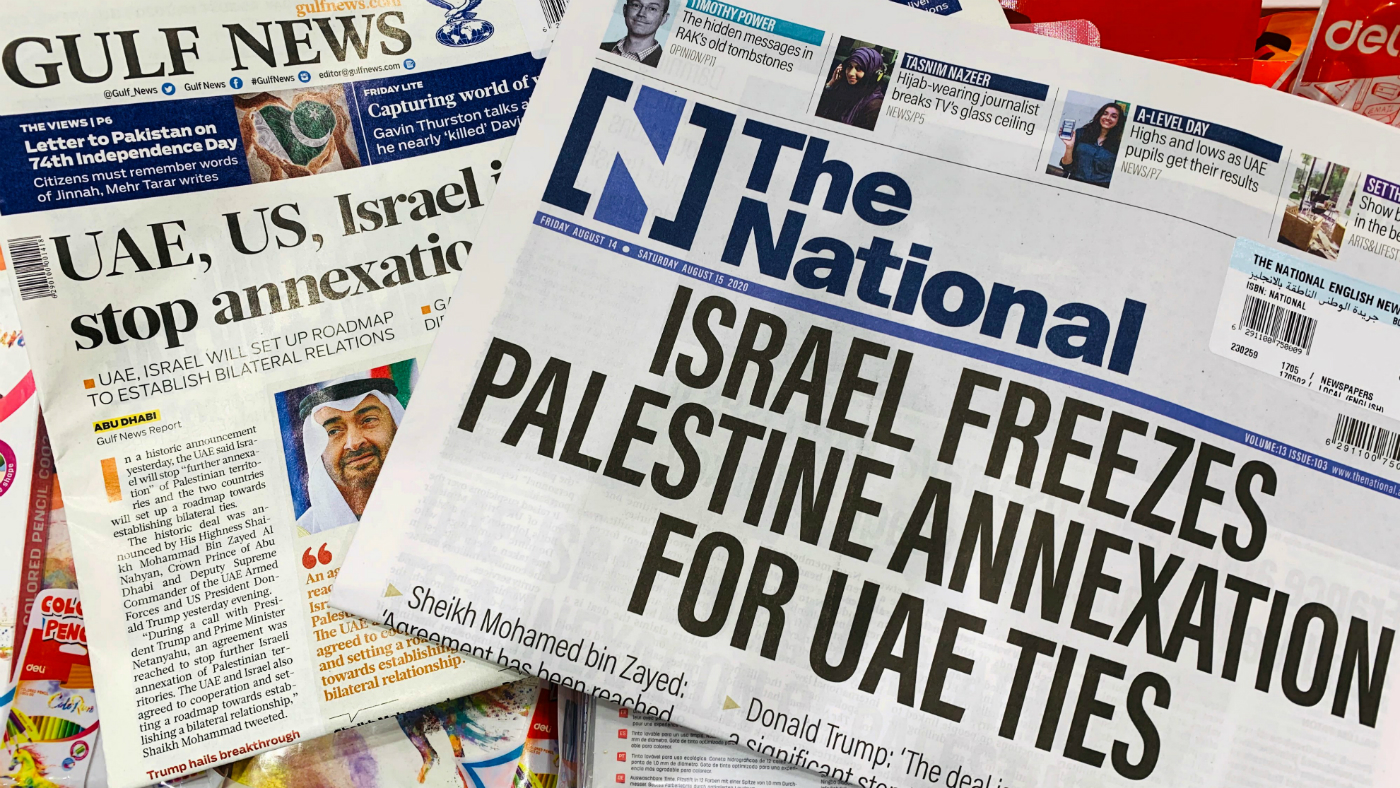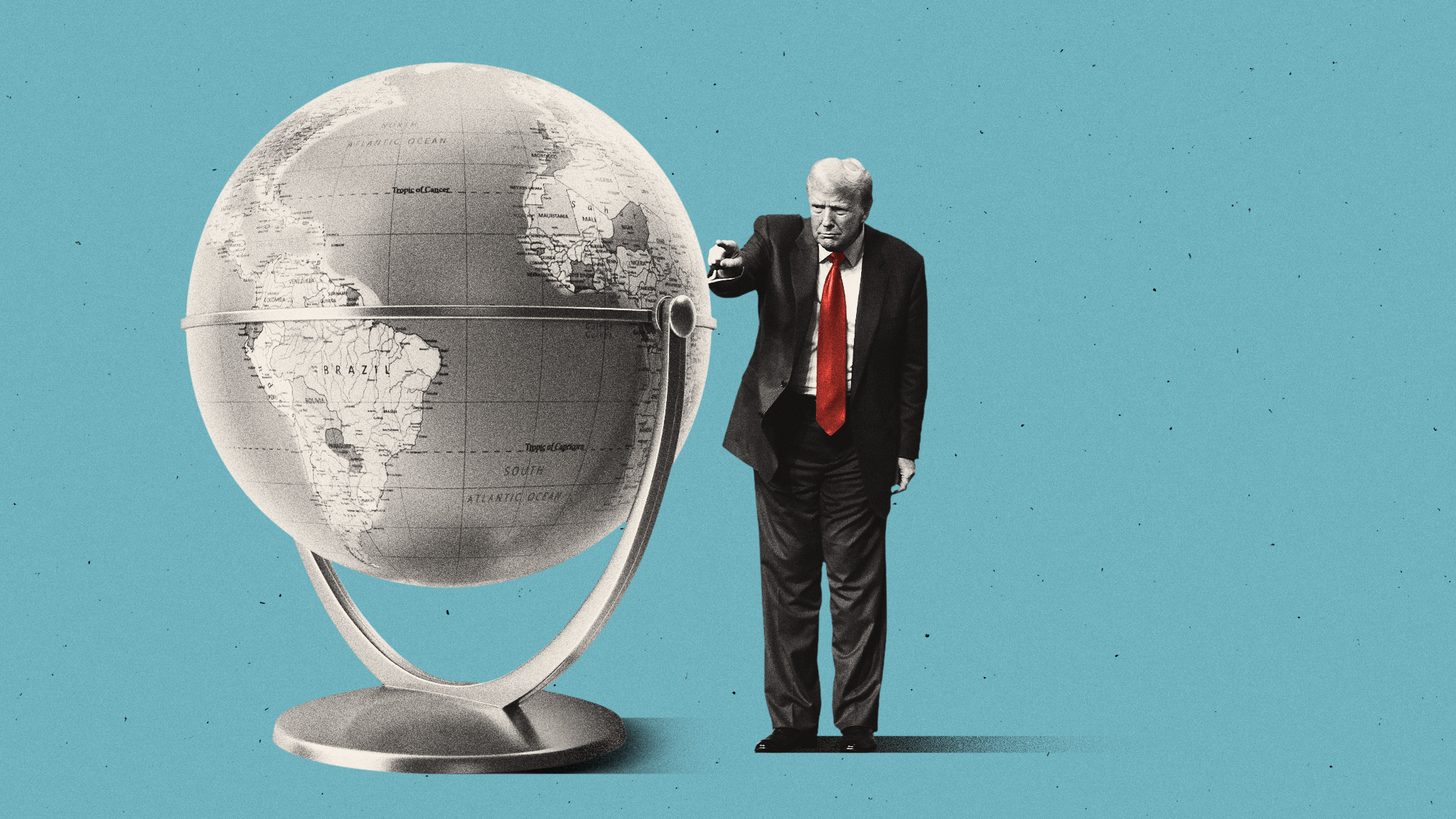Israel and the UAE: a fresh start?
White House hails ‘historic’ diplomatic deal but Palestinian allies are left enraged over annexation ‘betrayal’

A free daily email with the biggest news stories of the day – and the best features from TheWeek.com
You are now subscribed
Your newsletter sign-up was successful
Israel and the United Arab Emirates are on course to establish full diplomatic ties following the signing of a US-brokered deal under which Israel pledged to “suspend” its plans to annex Palestinian territory.
US President Donald Trump announced the deal on Thursday on Twitter, hailing it as a “huge breakthrough” for peace talks in the Middle East, while a White House statement praised the “courage of the United Arab Emirates and Israel to chart a new path that will unlock the great potential in the region”.
However, says The Guardian, “cracks in the deal became quickly apparent” when Israeli Prime Minister Benjamin Netanyahu claimed there would be “no change” to his annexation plans. The agreemenr also caused consternation among Palestine’s Arab allies in the Middle East, many of whom have accused the UAE of “betrayal”.
The Week
Escape your echo chamber. Get the facts behind the news, plus analysis from multiple perspectives.

Sign up for The Week's Free Newsletters
From our morning news briefing to a weekly Good News Newsletter, get the best of The Week delivered directly to your inbox.
From our morning news briefing to a weekly Good News Newsletter, get the best of The Week delivered directly to your inbox.
What does the deal do?
Under the deal, which was brokered by Washington, the UAE and Israel agree to establish full diplomatic ties. The UAE will be the first Gulf Arab state – and only the third Arab country after Egypt and Jordan – to form such ties with Israel.
The two countries will “join with the United States to launch a Strategic Agenda for the Middle East to expand diplomatic, trade, and security cooperation”, according to a White House statement.
As well as exchanging embassies and ambassadors, they will also “expand and accelerate cooperation regarding the treatment of and the development of a vaccine for the coronavirus”, the statement continued.
A free daily email with the biggest news stories of the day – and the best features from TheWeek.com
The most contentious aspect of the deal is the pledge that Israel will “suspend declaring sovereignty over areas outlined in [Donald Trump’s] Vision for Peace” and will instead “focus its efforts now on expanding ties with other countries in the Arab and Muslim world”.
The Vision for Peace is an agreement signed in January 2020 which envisages a Palestinian state and recognition of Israeli sovereignty over settlements in the occupied West Bank. However, it does not place any requirements on Israel to refrain from annexing the Jordan Valley, a fertile strip of land running along the border with Jordan that makes up almost 30% of the current territory of the Palestinian-controlled West Bank.
As a result, the phrasing appears to be key. Despite appearing to prevent Israeli annexation of the West Bank, the deal may be consistent with Netanyahu’s insistence that the “suspension” is merely a temporary moratorium.
In a televised address, the Israeli PM said he had agreed only to “delay” the annexation and would “never give up our rights to our land”.
“There is no change to my plan to extend sovereignty, our sovereignty in Judea and Samaria [Palestine],” he said.
What has the reaction been?
The BBC suggests that the deal “could mean a foreign policy victory for President Trump, who will seek re-election in November”, and “give a personal boost to Prime Minister Netanyahu, who is on trial for alleged corruption”.
Boris Johnson said the deal was “hugely good news”, while Foreign Secretary Dominic Raab said the UK welcomed the “historic step”. Meanwhile Democratic presidential candidate Joe Biden called the deal a “welcome, brave, and badly needed act of statesmanship”.
Israeli MPs have also praised the deal, with defence minister Benny Gantz praising the “alliance” between countries in the region, while the governments of Jordan, Egypt and Bahrain gave it a tentative welcome.
A number of other Muslim nations, however, have been enraged by the accord, expressing their fury at the UAE for its alleged “betrayal” of Palestine. They accuse Abu Dhabi of turning a blind eye to Israeli annexation efforts in order to antagonise Iran, Israel’s biggest rival in the region.
A spokesperon for Palestinian President Mahmoud Abbas said on Thursday that the Palestinian leadership “rejects and denounces the UAE, Israeli and US trilateral, surprising announcement”, calling it a “betrayal of Jerusalem, Al-Aqsa and the Palestinian cause”.
Turkey, which has had diplomatic relations with Israel for decades, has also lashed out against the deal, claiming the peoples of the region “will never forget and will never forgive this hypocritical behavior” by the UAE, the Associated Press reports.
Iran has called the deal a “dagger in the back” of all Muslims, according to a foreign ministry statement, which added that the deal was an act of “strategic stupidity” by the UAE that “will undoubtedly strengthen the axis of resistance in the region”.
-
 American universities are losing ground to their foreign counterparts
American universities are losing ground to their foreign counterpartsThe Explainer While Harvard is still near the top, other colleges have slipped
-
 How to navigate dating apps to find ‘the one’
How to navigate dating apps to find ‘the one’The Week Recommends Put an end to endless swiping and make real romantic connections
-
 Elon Musk’s pivot from Mars to the moon
Elon Musk’s pivot from Mars to the moonIn the Spotlight SpaceX shifts focus with IPO approaching
-
 New START: the final US-Russia nuclear treaty about to expire
New START: the final US-Russia nuclear treaty about to expireThe Explainer The last agreement between Washington and Moscow expires within weeks
-
 Would Europe defend Greenland from US aggression?
Would Europe defend Greenland from US aggression?Today’s Big Question ‘Mildness’ of EU pushback against Trump provocation ‘illustrates the bind Europe finds itself in’
-
 Greenland, Colombia, Cuba: where is Donald Trump eyeing up next?
Greenland, Colombia, Cuba: where is Donald Trump eyeing up next?Today's Big Question Ousting Venezuela’s leader could embolden the US administration to exert its dominance elsewhere
-
 Did Trump just end the US-Europe alliance?
Did Trump just end the US-Europe alliance?Today's Big Question New US national security policy drops ‘grenade’ on Europe and should serve as ‘the mother of all wake-up calls’
-
 Trump peace deal: an offer Zelenskyy can’t refuse?
Trump peace deal: an offer Zelenskyy can’t refuse?Today’s Big Question ‘Unpalatable’ US plan may strengthen embattled Ukrainian president at home
-
 Vladimir Putin’s ‘nuclear tsunami’ missile
Vladimir Putin’s ‘nuclear tsunami’ missileThe Explainer Russian president has boasted that there is no way to intercept the new weapon
-
 Russia’s war games and the threat to Nato
Russia’s war games and the threat to NatoIn depth Incursion into Poland and Zapad 2025 exercises seen as a test for Europe
-
 What will bring Vladimir Putin to the negotiating table?
What will bring Vladimir Putin to the negotiating table?Today’s Big Question With diplomatic efforts stalling, the US and EU turn again to sanctions as Russian drone strikes on Poland risk dramatically escalating conflict